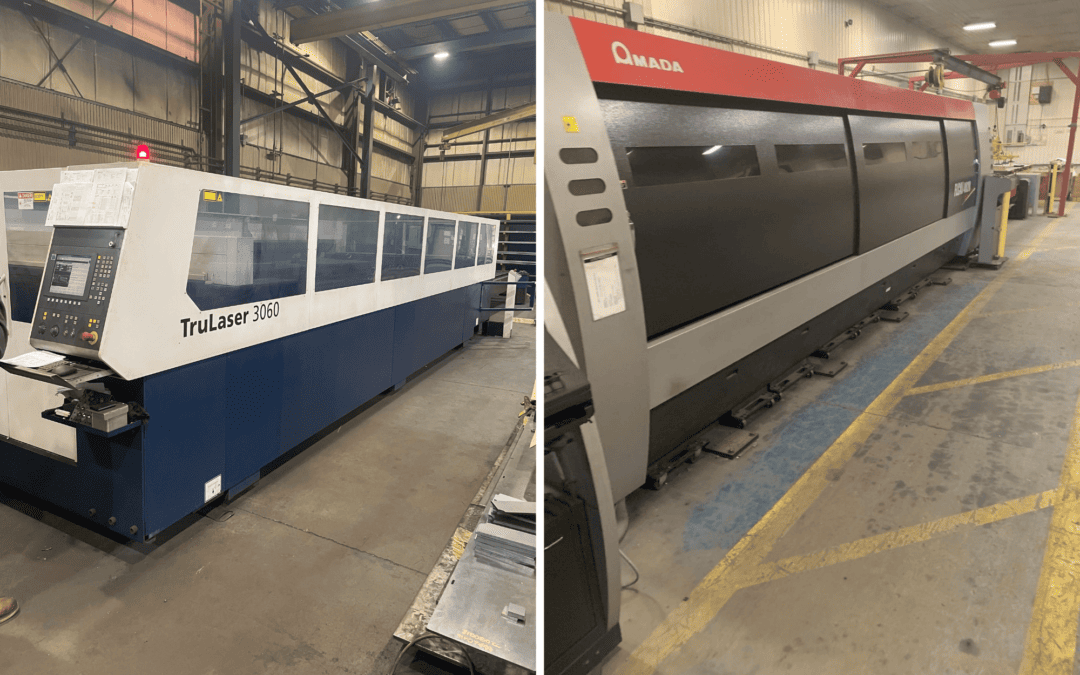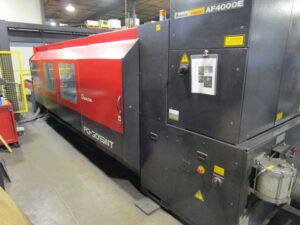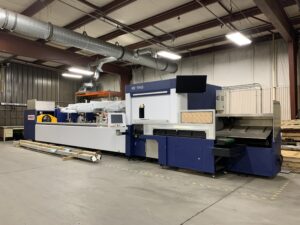CO2 Laser Machines vs. Fiber Laser Machines
In the world of industrial laser cutting machines, two primary contenders have emerged: CO2 lasers and Fiber lasers. Both technologies have distinct advantages and applications, making them popular choices in the manufacturing and fabrication industries. Understanding the differences between these laser cutting systems can help businesses make informed decisions when selecting the most suitable equipment for their specific needs. We’ll take you through the differences, advantages and disadvantages of CO2 and fiber laser cutting machines while also delving into the various types of each laser technology.
CO2 Lasers:
CO2 lasers are among the earliest laser technologies and have been widely used in various industrial applications for decades. These lasers use a mixture of gasses, including carbon dioxide, nitrogen, and helium, to generate the laser beam. Highly versatile, CO2 lasers can cut through a wide range of materials including plastics, wood, fabrics, glass, and some metals, making them especially popular for applications that require high-power cutting and engraving.
Advantages of CO2 Laser Cutting Machines:
- Versatility: CO2 lasers are versatile and can process a wide range of materials, including plastics, wood, fabrics, glass, and some metals.
- Smooth Cutting Edges: CO2 lasers provide clean and precise cuts, making them suitable for applications that demand high levels of accuracy and intricacy.
- Low Maintenance: CO2 lasers have fewer moving parts, resulting in lower maintenance requirements and longer machine life.
- Cost-Effective: CO2 laser machines are typically more affordable than Fiber laser machines, making them a cost-effective option for small to medium-sized businesses.
Disadvantages of CO2 Lasers:
- Slower Cutting Speed: CO2 lasers have a slower cutting speed compared to Fiber lasers, which may impact productivity in high-volume production environments.
- Higher Energy Consumption: CO2 lasers consume more energy, leading to higher operating costs over the long term.
Fiber Lasers
Fiber lasers are a more recent innovation in the laser cutting industry, using optical fibers to amplify the laser beam. These lasers are known for their high efficiency, excellent beam quality, and suitability for cutting a wide range of materials, especially metals.
Advantages of Fiber Laser Cutting Machines:
- Superior Cutting Speed: Fiber laser cutting machines offer significantly higher cutting speeds than CO2 lasers, resulting in faster production cycles and increased efficiency.
- Energy Efficiency: Fiber lasers are highly energy-efficient, consuming less power compared to CO2 lasers, which translates to lower operating costs.
- Low Maintenance: Fiber lasers have solid-state construction, leading to reduced maintenance needs and higher reliability.
- Precise Metal Cutting: Fiber lasers excel in cutting metals with high precision and accuracy, making them ideal for industries like automotive, aerospace, and electronics.
Disadvantages of Fiber Lasers:
- Limited Material Versatility: While Fiber lasers are excellent at cutting metals, they may not be as versatile as CO2 lasers when it comes to processing non-metallic materials.
- Higher Initial Investment: Fiber laser machines tend to have a higher upfront cost than CO2 laser machines, which may be a deterrent for some businesses.
Final Thoughts
Both industrial CO2 lasers and industrial Fiber lasers offer distinct advantages that cater to different manufacturing and cutting needs. CO2 lasers are versatile and cost-effective, making them an attractive choice for businesses that work with various materials and require precision cutting capabilities. On the other hand, Fiber lasers are known for their high-speed metal cutting abilities, energy efficiency, and low maintenance requirements, making them the preferred option for metal-intensive industries.
Selecting between CO2 lasers and Fiber lasers ultimately depends on the specific requirements of a business, such as the type of materials to be processed, production volume, and budget constraints. Manufacturers and fabricators should carefully assess their needs and consult with reputable suppliers to choose the most suitable laser cutting machine that aligns with their unique applications and long-term goals. Whichever technology they opt for, the advancements in industrial lasers are revolutionizing the manufacturing landscape and enabling greater precision, efficiency, and productivity.
Revelation Machinery always offers a wide variety of used industrial lasers for sale including CO2 lasers, fiber lasers, tube lasers, and laser engravers. Contact our used equipment experts and let us help you bring greater precision and productivity to your workshop.
Interested in selling your used industrial laser equipment? Find out how to sell your industrial lasers for cash to Revelation Machinery today.



